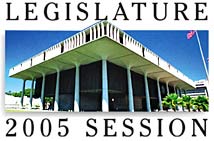Study finds gas prices
could go up 20 cents
with new cap
FORMULATING PRICE
How prices are calculated under the state's gasoline price cap:
The state Public Utilities Commission sets a maximum pretax wholesale price at which gasoline can be sold in Hawaii based on the weekly average of spot prices in Los Angeles, New York and the U.S. Gulf Coast. An additional 4 cents a gallon is added to account for increased fuel transport costs stemming from Hawaii's location, and retailers are allowed to add up to 18 cents a gallon to cover other costs. Retailers also may add up to 9 cents a gallon and 5 cents a gallon, respectively, to account for added costs related to premium and midgrade gasoline. Other charges to account for the added cost of providing gasoline on neighbor islands are being determined by the PUC and ICF Consulting.
B.J. Reyes, Star-Bulletin
|
If the cap had been in place between 1999 and 2004, the average wholesale cost of gas would have been about 10 to 13 cents a gallon lower, according to the study.
However, under current market conditions, the maximum price at which wholesale gas could be sold in Hawaii would be about 20 cents a gallon higher under the gas cap.
Senate Consumer Protection Chairman Ron Menor, who has shepherded the gas cap measure through the Legislature, said he is confident that upward spikes in prices would only be temporary and that a higher price ceiling would not necessarily translate to higher prices at the pump.
"What we're talking about here is a cap, not a figure or targeting mechanism that forces the suppliers and dealers to charge at a certain level," said Menor (D, Mililani). "I think we need to look at the overall picture, in which for the longest time Hawaii prices, quite frankly, have been much higher than the mainland prices.
"I'm anticipating that if wholesale prices drop for dealers that many of them will choose to pass on those savings to consumers in the form of lower pump prices, because of the fact in a competitive market many dealers would want to charge lower prices to attract more customers."
How prices at the pump would be affected is not clear.
Thomas O'Connor, project manager for Washington, D.C.-based ICF, noted that even if wholesale gas costs go down, there is no guarantee that retailers would pass along the savings to motorists.
|
|
He noted that the cap would cause Hawaii's gas prices to fluctuate in a fashion similar to how prices in mainland markets react to market forces.
Critics remained unconvinced. "All it's going to do is cause a lot of confusion. It's going to cause prices to go up and down and up and down with very little impact at the consumer level, if any," said Bill Green, owner of Kahala Shell. "The price cap that the law is requiring ... will be very comparable to the prices that have been in effect."
Melissa Pavlicek, a spokeswoman for the Western States Petroleum Association, said she does not think motorists will see any real savings. "I think when the price goes up, retailers are going to be forced to pass along the increase," she said. "When prices go down, retailers are saying that they may have to charge more because their margins are so very thin as it is."
Menor said he is confident the legislation will survive this session and that the Public Utilities Commission will have a cap in place on time.
However, the Senate has advanced a proposal in House Bill 863 that would give Gov. Linda Lingle the authority to decide whether the cap should go into effect. Lingle, who opposes price caps, has said she likely would not implement the cap if the decision is left to her.
Both the House and Senate would have to agree on the proposal for it to go to Lingle for consideration.
In the House, Consumer Protection Vice Chairman Brian Schatz said colleagues are scrutinizing the legislation as it progresses. "We think that it makes sense to give broad discretion to the executive here because this has never been done in any other place," said Schatz (D, Tantalus-Makiki).
[News] [Business] [Features] [Sports] [Editorial] [Do It Electric!]
[Classified Ads] [Search] [Subscribe] [Info] [Letter to Editor]
[Feedback]

